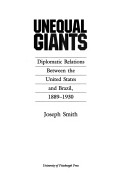In 1889 the Brazilian empire was overthrown by a military coup and a republic was declared. This dramatic event inaugurated a new awareness in the United States of its giant "sister republic" in South America. In this study of diplomatic relations, Joseph Smith aims to fill a significant gap in the literature and offers a case study of US policy in the hemisphere. It has long been axiomatic to regard the United States and Brazil as natural friends and allies. Yet Smith's research in American, British, and Brazilian archives shows that, in reality, diplomatic relations between the republics were characterized as much by conflict as by harmony. The goodwill and assistance of the United States proved valuable in helping to protect the infant republic from both internal and external threats, and Brazil's decision to enter World War I on the side of the Allies pleased the United States. But America's apparently irresistible political and economic advance in Brazil was persistently hampered by disagreements. Smith argues that the idea of an equal relationship always enjoyed much more currency in Brazil than in the United States.
He concludes that it was more than a useful pretence that served the ambitions and vanities of Brazil's ruling elite and provided the United States with a means of securing a cooperative instrument to divide and rule in Latin America. The underlying reality was that the two giants were truly unequal.
- ISBN10 0822936763
- ISBN13 9780822936763
- Publish Date November 1991 (first published 15 September 1991)
- Publish Status Out of Print
- Out of Print 19 October 2003
- Publish Country US
- Imprint University of Pittsburgh Press
- Format Hardcover
- Pages 312
- Language English
